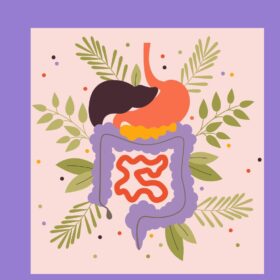Having a colostomy or ileostomy doesn’t necessarily mean your whole life will change. However, it will have an impact on your digestive system. For World Digestive Health Day, we’re giving you the lowdown on the digestive system and how your stoma might affect it.
What is the digestive system?
The digestive system is a finely tuned network responsible for breaking down food, absorbing nutrients, and regulating fluids and electrolytes. It begins at the mouth and ends at the rectum, with organs like the stomach, small intestine (ileum), colon (large intestine), and rectum playing essential roles.
How Does Having a Stoma Change the Digestive System?
As colostomies and ileostomies remove or bypass parts of the small or large intestines, they can change the way your digestive system works. With an ileostomy, the colon, normally responsible for absorbing excess water and salts, is no longer in use. This makes the digestive system less efficient at reabsorbing fluids, causing more watery output and increasing the risk of dehydration and electrolyte imbalances. It also places greater stress on the small intestine to manage both digestion and fluid regulation.
The Importance of Hydration
Hydration supports nearly every digestive function: it keeps intestinal contents moving, helps absorb nutrients, and maintains the electrolyte balance essential for cell function and nerve transmission.
When you have a stoma, especially an ileostomy, your risk of dehydration increases significantly because:
- Fluids pass through the gut more quickly
- Salt and electrolyte loss is greater
- You may not feel as thirsty, especially in older age or during illness
Recognising Dehydration
Common signs of dehydration include:
- Dry mouth and lips
- Headaches
- Dizziness, especially when standing
- Dark or low urine output
- Muscle cramps
- Nausea or fatigue
- Reduced stoma output or, if you have an ileostomy, output with a thicker consistency (an early sign)
If you experience these symptoms, increase your fluid intake (unless otherwise medically advised) and contact your Stoma Care Nurse or GP if symptoms persist.
You can find more information and advice in our free hydration guide.
Nutrient Absorption and Stomas
With a shorter digestive tract, food moves more quickly through your system which gives your body less time to break down nutrients. This can result in:
- Vitamin B12 deficiency (especially if the ileum is removed or damaged)
- Fat malabsorption, leading to deficiencies in vitamins A, D, E, and K
- Loss of electrolytes, such as sodium, potassium, and magnesium
People with an ileostomy may also struggle to absorb bile salts, which help digest fats. This can cause loose stools and further nutrient loss.
People with a colostomy may be less impacted, particularly if a large portion of the colon remains. However, certain nutrients may still be poorly absorbed depending on the nature of the colostomy.
One of the best ways to ensure your body is getting the nutrients it needs is to make sure you eat a balanced diet. You can find more advice on diet and nutrition in our free downloadable guide.
Stomas and the Microbiome
The gut microbiome, a population of trillions of bacteria, plays a crucial role in supporting the immune system. It also produces certain vitamins like K and some of the B vitamins, and ferments indigestible fibres producing short-chain fatty acids.
After stoma surgery, especially if the colon is removed or bypassed, this ecosystem can change. Studies have shown that a stoma can reduce bacterial diversity which may lead to inflammation and digestive imbalance. This can also increase susceptibility to gut infections. Although much of the microbiome resides in the colon, the small intestine also has its own microbiome.
You can support your gut flora by:
- Eating probiotic foods (e.g. live yoghurt, kefir).
- Including prebiotics (e.g. oats, bananas, chicory) as tolerated.
- Avoiding unnecessary antibiotics unless prescribed.
Living with a stoma is a journey of adjustment but it doesn’t mean you have to give up your favourite foods and activities like eating out. You can still enjoy life to the fullest by learning how to support your body’s needs in new ways. By understanding how your digestive system works and the unique ways a colostomy or ileostomy might affect it, you’re already taking proactive steps toward better health and wellbeing.
